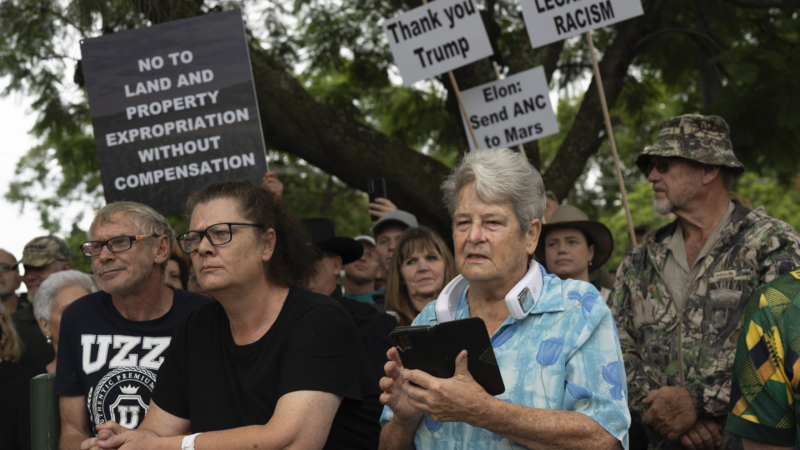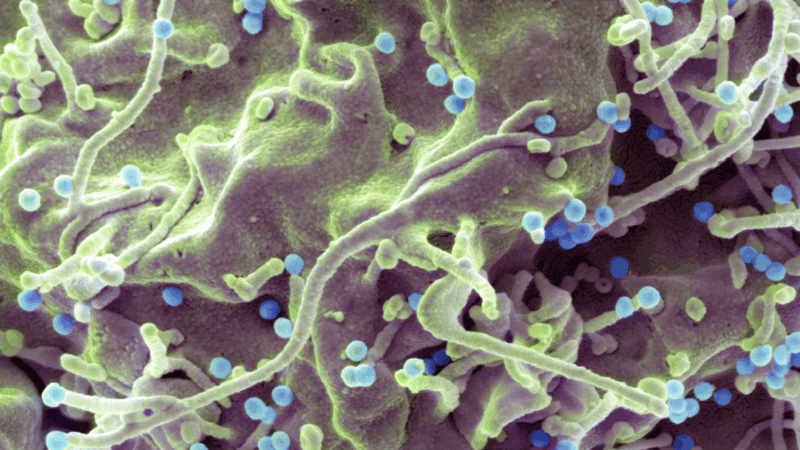First group of Afrikaners granted refugee status are on their way to the U.S.
JOHANNESBURG, South Africa — A group of 49 white Afrikaners who have been given refugee status by the Trump administration departed South Africa Sunday night on a charter flight paid for by the U.S. government, and will be arriving at Dulles airport on Monday.
The Afrikaners, descendants of mainly Dutch colonists, were seen at the airport in Johannesburg with trolleys full of suitcases, but declined to speak to the media. They are expected to give a press conference upon arrival in the United States., where they will be greeted by U.S. officials.
One document seen by NPR said there would be food and “items for the children” upon arrival. It said the refugee services office of the Catholic diocese of Virginia would be onsite to offer assistance. After the press conference the families will depart for their end destinations in several states including Minnesota, Nevada, and Idaho.
The South Africans will now have a pathway to U.S. citizenship and be eligible for government benefits.
Another document seen by NPR included detailed guidance for the South Africans arriving. American family members of Afrikaners granted refugee status would be asked to help them. Those who didn’t have family in the country would be “placed in a location that has a local organization to provide you with support,” it said.
“Your case manager will pick you up from the airport and take you to housing that they have arranged for you. This housing may be temporary (like a hotel) while a local organization helps you identify more long-term housing,” it said.
The South Africans are also informed: “You are expected to support yourself quickly in finding work. Adults are expected to accept entry level employment in fields like warehousing, manufacturing, and customer service. You can work toward higher level employment over time.”
However, the document stated that “Any credentials from your home country may not automatically transfer to the United States.” That last point will be of interest to many Afrikaner applicants — some of whom are farmers and have previously told NPR they hope to continue farming in the U.S.
South Africans incredulous
The resettlement effort comes after President Trump signed an executive order in February claiming minority Afrikaners were being unfairly treated in South Africa, and offering them possible resettlement in the U.S. Trump also cut off aid to South Africa, which has been in his crosshairs since he returned to office for its DEI policies and support of the Palestinians.
Trump also says the South African government is taking land from Afrikaners, but there is no evidence of this. The South African government did pass a land reform law earlier this year, allowing in rare circumstances for expropriation without compensation, but zero land has been seized. In fact, while whites in South Africa account for some 7 percent of the population, they still own about 70% of commercial farmland.
The South African government has been surprised by Trump’s attacks, saying he has been taken in by disinformation. After learning from news reports that the first group of Afrikaners had been granted refugee status and were headed to the United States, President Ramaphosa’s spokesman slammed Washington.
“These people won’t be stopped from going, albeit under a false narrative,” the spokesman, Vincent Magwenya, told NPR. “There’s no legal or any factual basis for the executive order sanctioning this action. None of the provisions of international law on the definition of refugees are applicable in this case.”
“Disturbingly, one has to admit that our sovereignty as a country is being grossly undermined and violated by the United States,” Magwenya added.
And it’s not only the South African government that has expressed disagreement. Many South Africans — Black and white — bar a small rightwing minority, are incredulous. NPR spoke to ordinary citizens who were concerned race relations were being set back, three decades after the end of the racist system of apartheid — an Afrikaner policy — when Nelson Mandela ushered in a multi-racial democracy.
Many South Africans have taken to social media to post memes and comedic videos, casting doubt on claims that whites who leave for the U.S. are persecuted, joking they will miss their “privileged lives, domestic workers, and beach holidays.”
But not all Afrikaners in South Africa are prosperous. And — like people across the racial spectrum — some have suffered from violent crime and attacks. It will likely be these stories that they tell on arrival at Dulles.
Refugee advocates in the U.S. have noted how unusual it is that the Afrikaners were processed so quickly — there were about three months between Trump’s executive orders and the first group’s departure for the US. Often, applications for refugee status in the US can take years to process.
A U.S. government employee, who was not authorized to speak to the media, told NPR they considered what is happening in this case “immigration fraud.”
The Afrikaners arrival comes after Trump effectively suspended the U.S. refugee admissions program in January.
“Across the country, refugee resettlement agencies have closed or cut staff, and for refugees about to fly to the U.S., their travel authorizations were cancelled, thousands are now stuck waiting and face growing danger,” Kenn Speicher, who founded NOVA Refugees, a support network in the DC-region, told NPR.
A new one-a-day-pill holds promise for HIV’s ‘forgotten population’
It's designed to take the place of complicated, multiple drug regimens that many people with HIV need to follow. And it's also beneficial because the HIV virus is always evolving.
For filmmaker Chloé Zhao, creative life was never linear
Director Chloé Zhao used meditation, somatic exercises and dance to inspire the cast and crew of this Oscar-nominated story about William Shakespeare's family.
10 new books in March offer mental vacations
March is always a big one for books – this year is no different. We call out a handful of upcoming titles for readers to put on their radars — offering a good alternative to doomscrolling.
Sen. Chris Coons, D-Del., talks about the war with Iran and upcoming war powers vote
NPR's A Martínez asks Delaware Democrat Chris Coons, a member of the Senate Foreign Affairs Committee, about the war with Iran.
The candy heir vs. chocolate skimpflation
The grandson of the Reese's Peanut Butter Cups creator has launched a campaign against The Hershey Company, which owns the Reese's brand. He wants them to stop skimping on ingredients.
Scientists make a pocket-sized AI brain with help from monkey neurons
A new study suggests AI systems could be a lot more efficient. Researchers were able to shrink an AI vision model to 1/1000th of its original size.







